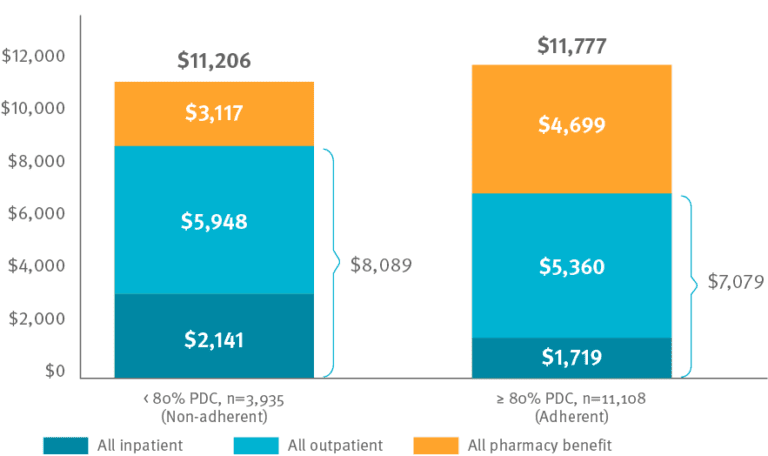Perspectives
Diabetes medication adherence associated with lower hospitalization rate
Those adherent have an associated 31% lower hospitalization risk
December 21, 2018More than 30 million Americans, or 9 percent of us have diabetes.1 Can adherence be linked with lower medical costs? Yes. Adherence to diabetes medications is associated with $1,010 lower annual medical costs. And members who stay adherent also have an associated 31 percent lower risk of hospitalization. But there’s more.
What was the study about?
This study followed more than 15,000 individuals with a diabetes medical claim for one year. The goal was to look at hospitalization rates, and medical and pharmacy costs. It compares the costs of the diabetes-drug adherent and nonadherent members.
Previous studies on adherence to diabetes medications had focused on more limited populations – a single employer or a retiree population.
What did we learn?
Three-fourths of the members in the study were adherent to their medications; one-fourth were nonadherent. Those adhering to medications were found to have an associated 31 percent lower risk of hospitalization and lower medical costs ($1,010) than the nonadherent group.
Methods
Researchers from Prime reviewed pharmacy and medical claims from a commercial medical plan with 1.3 million members. The study criteria included:
Continuous enrollment between 2007 and 2009
Two separate office visits for diabetes or a diabetes-related hospitalization in 2008
A diabetes medication supply or a diagnosis of diabetes with microvascular disaease
All medical and pharmacy claim costs were added up to determine the total cost of care. A total of 15,000 members fit the criteria and were followed for one year.
Results
Of the group followed, 74 percent were adherent to their medication. 26 percent were nonadherent.
Annual total cost of care for adherent members in the study was $11,777; of that, $4,699 were pharmacy costs. Total cost of care for nonadherent members was $11,206, of that, $3,117 represented pharmacy costs. Although pharmacy costs were higher, the annual medical costs were $1,010 less in the adherent group at $7,079, compared to $8,089 in the nonadherent group.
Total one year cost of care by diabetes medication adherence

Conclusions
The study found an association between adherence to diabetes medications and risk of hospitalization. This is consistent with previous research. Individuals with diabetes who adhere to their medication had an associated one-third lower risk of hospitalization when compared to patients who do not adhere to their medication.
Until now, there has been little data quantifying the potential value of improved outcomes with better medication adherence in a large commercially insured population.
This study is one of the largest of its kind.
What does this mean for you?
Adherence to diabetes medications is associated with a lower risk of hospitalization and lower medical costs. This is good news: This can mean improved health outcomes for your employees who stay adherent to their diabetes medications.
This study also suggests that there is not a medical cost offset to increased adherence.
To understand this, it’s helpful to look at the pharmacy spend landscape: Diabetes drugs are expensive. They are the largest single component of drug spend (14.1 percent in 2017).2 The costs of diabetes drugs have been rising very quickly.
When you focus on improving adherence for members with diabetes, focus first on members with coexisting cardiovascular (heart) conditions. Adherence may help them reduce adverse medical events. GuidedHealth® has targeted, outreach and adherence programs that can help.
References
- Statistics about Diabetes. American Diabetes Association. http://www.diabetes.org/diabetes-basics/statistics/
- Spring 2018 Prime Drug Trend Report. Accessed at: https://www.primetherapeutics.com/content/dam/corporate/Documents/Newsroom/Pressreleases/2018/document-commercial-trend-spring-2018.pdf
GuidedHealth is a registered trademark of Prime Therapeutics of LLC.
Related news
Perspectives
July 25, 2024
Quarterly Drug Pipeline: July 2024
Clinical insights and competitive intelligence on anticipated drugs in development
Perspectives
July 22, 2024
Oncology Insights: 2024 ASCO Annual Meeting key findings
Findings from this year’s American Society of Clinical Oncology (ASCO) Annual Meeting will likely lead to clinical practice changes and U.S. Food and Drug Administration (FDA) drug approvals or expansions
Perspectives
July 16, 2024
LISTEN NOW: Beyond the business – Stories of corporate kindness | Pharmacy Friends Podcast
In this episode, we talk about how our employees' help goes beyond our work in health care, aiding in philanthropic efforts